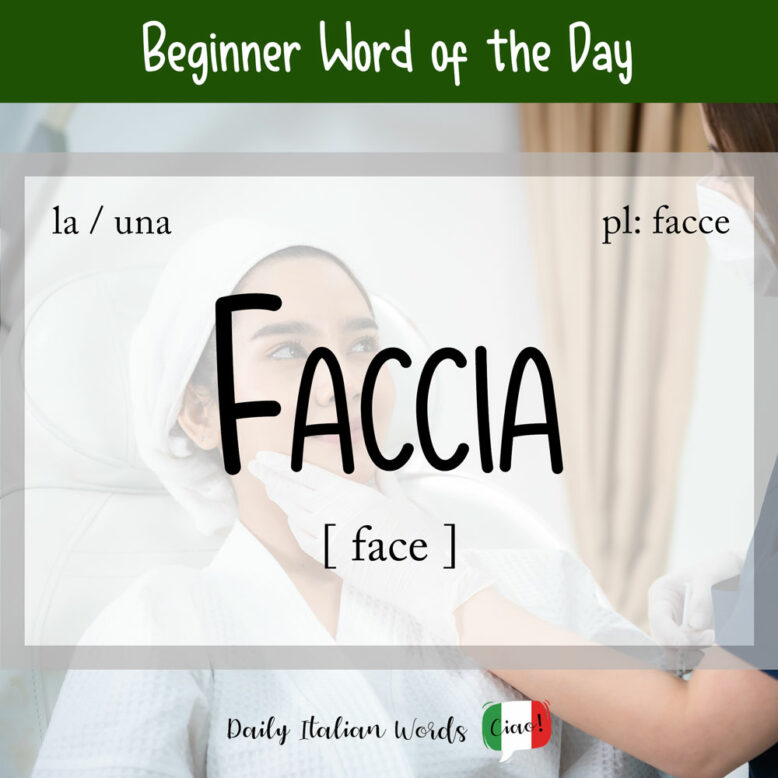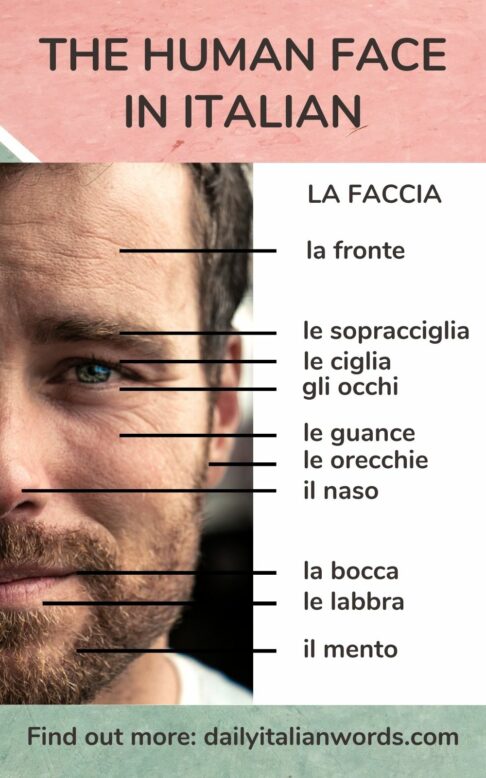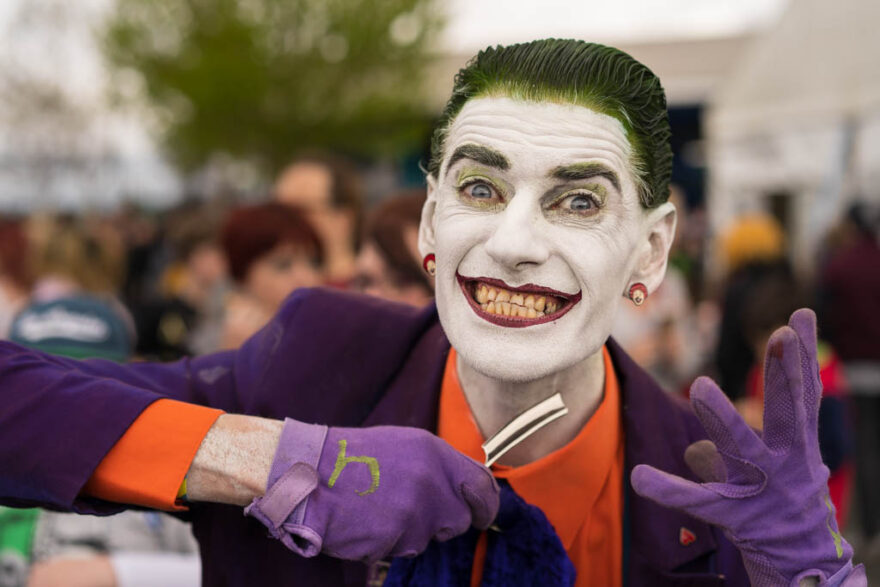The word faccia (plural: facce) in Italian is the most widely used term for face.

la faccia
una faccia
le facce
delle facce
Mi sono lavato la faccia stamattina.
I washed my face this morning.
Below are the main componants that make up a human face:
- occhio = eye (plural: occhi)
- naso = nose (plural: nasi)
- bocca = mouth (plural: bocche)
- orecchio = ear (plural: orecchie)
- ciglio = eyelash (plural: ciglia)
- sopracciglio = eyebrow (plural: sopracciglia)
- mento = chin (plural: menti)
- fronte = forehead (plural: fronti)
- guancia = cheek (plural: guance)
- labbro = lip (plural: labbra)

It is used in both the literal, anatomical sense of the word and in figurative ways.
Literal examples:
- La sua faccia dice tutto! = His face says it all!
- La mia faccia è così pallida. = My face is so pale.
- Ti spacco la faccia! = I’ll smash your face in!
- La faccia comprende gli occhi, il naso, la bocca… = The face is made up of the eyes, nose, mouth…
Figurative examples:
- Hai la faccia tosta. = You have quite the nerve.
- Il capo ha perso la faccia. = The boss lost face.
- Il bambino ha fatto una faccia. = The child pulled a face.
- Alla faccia tua! = In your face!
- Mi sta ridendo in faccia. = He’s laughing to my face.
- Abbiamo parlato faccia a faccia. = We spoke face to face.
- È riuscito a salvarsi la faccia = He managed to save his reputation.
By transforming faccia into its diminutive forms, you get faccetta or faccina which literally mean small face. The latter is also the word Italians use for an emoticon. A faccione is a big face.
Amanda ha messo una faccina alla fine della frase.
Amanda put an emoticon at the end of the sentence.
The expression Alla faccia! can be used to express surprise or admiration, even in ironic terms.
Hanno raddoppiato i prezzi da un giorno all’altro! – Alla faccia dell’onestà!
They doubled the price of the tickets from one day to the next! – So much for honesty!
As in English, faccia isn’t only used for human faces – it can also refer to the exposed surface of an object, such as a geometric shape. In addition to this, it can also mean side (of an argument, coin, etc.), facet (of a jewel), or aspect (of a question, debate, etc.).

Faccia vs Viso vs Volto
If you’ve been learning Italian for a while, you will certainly have come across two other words for face in Italian: viso and volto. Let’s start with viso since this is the word that can replace faccia in many contexts.
Whereas the meaning of faccia is multifaceted, viso has a more limited usage. It can only refer to the human face and is mostly used in a literal rather than figurative sense.
- Il suo viso era bello e allegro. = His face was handsome and cheerful.
- Ho comprato una crema per il viso. = I bought a face cream.
- Il suo viso era talmente cambiato che nemmeno sua madre sarebbe stata in grado di riconoscerlo. = So changed was his face that not even his mother would have been able to recognise him.
That said, a few figurative phrases containing the word viso do exist.
- a viso aperto = openly, frankly
- fare buon viso a cattivo gioco = to grin and bear it, make the best of a bad situation
- far buon viso = to put on a good face
Volto differs from both faccia and viso in that it is often used in literary, artistic and religious contexts and is imbued with a loftier, more important tone. You might use this word to describe a famous actor’s face or that of a statue, but less in reference to your own face or that of a friend.
- Il volto della Vergine era stato preso dal volto naturale di una donna molto bella. = The face of the Virgin was taken from the natural face of a very beautiful woman.
- Hannibal avrà per sempre il volto di Anthony Hopkins. = Hannibal will always have Anthony Hopkin’s face.
- L’aspetto del vero volto di Gesù è un quesito molto diffuso. = The appearance of the true face of Jesus is a widespread question.
Volto can also mean appearance or nature and is used to describe the true essence of someone or something:
- il volto della natura = nature’s face
- scoprire il vero volto di qualcuno = to discover the true nature of someone
It too can be used in a figurative sense, as in the examples below:
- Il Volto della Morte = The Face of Death (a book by Alexandra Marinina)
- Un Uomo Senza Volto = A Faceless Man (a film directed by Leonardo Cortese)
In cinema and television, volto can also mean personality:
Oggi hanno presentato al pubblico i nuovi volti del programma televisivo.
Today they presented the new personalities of the TV show to the audience.
If you are at a loss over which word to use, rest assured that faccia will see you through in 90% of cases!

Heather Broster is a graduate with honours in linguistics from the University of Western Ontario. She is an aspiring polyglot, proficient in English and Italian, as well as Japanese, Welsh, and French to varying degrees of fluency. Originally from Toronto, Heather has resided in various countries, notably Italy for a period of six years. Her primary focus lies in the fields of language acquisition, education, and bilingual instruction.


